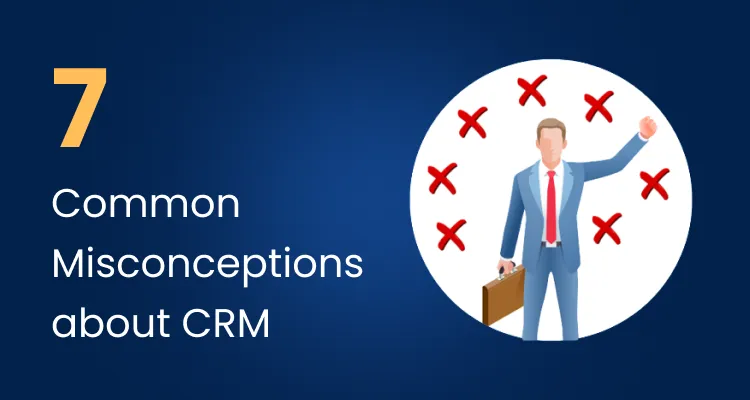7 Crucial Tips to Grow Your Study Abroad Business by 5X
Are you an education consultant looking to expand and accelerate your study abroad business?...
Don't miss this Exclusive Offer - it won't be Available Later!

In the dynamic landscape of business management and customer relations, Customer Relationship Management (CRM) systems have emerged as indispensable tools. Yet, like any innovative technology, misconceptions often cloud the understanding of what CRMs truly entail. In this exploration, we delve into the realm of CRM to unravel the truth behind the misconceptions that surround it. From complexity and costs to data security concerns and adoption challenges, we address these seven common misunderstandings head-on, aiming to equip you with accurate insights that pave the way for informed decisions and effective CRM implementation.
Join us as we navigate through the realm of CRM and illuminate the realities that lie beyond the misconceptions:
A prevalent misconception has taken root—that CRM is inherently complex. This belief often arises from the wide array of features offered by modern CRMs, which can initially seem overwhelming. The perceived intricacy may lead to the impression that CRM demands intricate technical knowledge for effective utilization.
Unraveling the Reality:
Contrary to this notion, leading CRM providers prioritize user-friendliness. They offer intuitive interfaces and dashboards, making navigation and utilization accessible to users without extensive technical backgrounds. CRMs are not designed to complicate business operations; they are conceived to simplify them. By consolidating essential functions like lead management, sales tracking, and customer communication into a centralized platform, CRMs enhance efficiency and informed decision-making.
Moreover, the complexity perception can be mitigated through comprehensive training and support provided by CRM vendors. Onboarding assistance and training sessions equip users with the necessary skills, ensuring they can harness the CRM's capabilities effectively. By debunking the myth that CRM is inherently complicated, businesses can embrace these systems with confidence, realizing their potential to streamline operations and empower growth.
The belief that they are universally costly stands out prominently. The idea that CRM is inherently expensive can be attributed to various factors. The assumption may arise from considering upfront costs, including software licenses, implementation, and customization expenses. Additionally, the perception might be influenced by the notion that integrating CRM into existing workflows demands a substantial financial commitment.
While CRM implementation does involve initial costs, it is essential to consider the broader context. Total Cost of Ownership (TCO) calculations encompass not only the initial investment but also ongoing expenses, such as maintenance, upgrades, and training.
One of the key aspects often overlooked in the cost misconception is the potential Return on Investment (ROI). CRMs are designed to enhance efficiency, streamline operations, and optimize customer engagement
While there are expenses associated with CRM adoption, understanding the nuanced financial aspects, such as TCO, ROI, and scalability, provides a more accurate perspective. By considering the long-term benefits and the ability to tailor investments to goals, businesses can make informed decisions regarding CRM adoption. The journey to embracing CRM becomes one of strategic investments in enhanced efficiency, customer satisfaction, and sustainable growth.
The perception that obtaining initial support and handholding for CRM implementation is difficult arises from the unfamiliarity with the process. Businesses may fear the complexity of integrating CRM into existing workflows, training employees, and aligning the system with their unique needs. This uncertainty can lead to apprehensions about insufficient guidance during the crucial initial phase.
Contrary to the misconception, leading CRM providers recognize the importance of seamless onboarding. They offer comprehensive training sessions and robust support mechanisms to ensure that businesses and their employees are equipped with the necessary skills and knowledge.
The apprehension of being left to navigate CRM adoption alone is unfounded. CRM vendors often work closely with businesses to create tailored implementation plans. These plans consider the organization's goals, existing workflows, and the level of support required. With step-by-step guidance and personalized assistance, businesses can confidently embark on their CRM journey.
Businesses can approach CRM adoption with a sense of reassurance. The availability of comprehensive onboarding, dedicated support channels, tailored implementation plans, and ongoing assistance signifies that the journey toward CRM implementation is paved with guidance at every step. By recognizing the collaborative effort between CRM providers and businesses, the transition becomes a collaborative partnership toward achieving enhanced efficiency, customer engagement, and organizational growth.
Misconception revolves around the difficulty of migrating data from familiar Excel spreadsheets to the CRM environment. This apprehension often stems from the perceived complexity of transferring existing data, fear of data loss, and concerns about disrupting established workflows. In this exploration, we delve into the reality behind this misconception, shedding light on the process and strategies that can make data migration a smooth and successful transition.
Contrary to this misconception, the migration process can be methodically planned and executed. Leading CRM providers offer tools and guidance for data mapping and conversion. This involves identifying equivalent fields in the CRM, ensuring data consistency, and mapping Excel data to the appropriate sections in the CRM, streamlining the migration process.
Data migration provides an excellent opportunity for businesses to clean and enhance their data.
The availability of strategic data mapping, data cleansing opportunities, expert support, and minimal workflow disruption ensures that data migration can be executed smoothly. By recognizing the guidance and tools provided by CRM providers, businesses can make a successful transition, transforming their data into a valuable asset within the CRM ecosystem.
This misconception revolves around concerns that CRM adoption might compromise sensitive business and customer data, potentially leading to data breaches and leaks. In this exploration, we delve into the actualities of database security within CRMs, shedding light on the robust measures in place to ensure data protection and dispelling the misconceptions that surround this critical aspect.
CRMs incorporate role-based access controls, which allow businesses to define who has access to what information within the system. This granular control ensures that only authorized personnel can view sensitive data, mitigating the risk of data exposure.
The comprehensive measures, including data encryption, access controls, authentication mechanisms, security audits, and data recovery options, underscore CRM providers' commitment to safeguarding sensitive information. Rather than being a source of concern, CRM systems serve as fortified repositories that fortify data protection. Recognizing the layers of security embedded within CRMs, businesses can embrace this technology as a means to enhance their operations while ensuring the safety of valuable data.
This notion stems from the perception that adopting CRM requires constant technical expertise, leading businesses to believe they must invest in a dedicated tech team. In this exploration, we unravel the reality behind this misconception, shedding light on the extent of technical support required and the available alternatives that ensure successful CRM adoption.
Contrary to this misconception, CRM providers acknowledge the diverse needs of businesses and offer a range of technical support options. While having an in-house tech team can offer advantages in terms of immediate accessibility, many CRM vendors provide comprehensive technical support as part of their services. This support encompasses system setup, customization, troubleshooting, and even regular system updates.
Another viable alternative is outsourcing technical assistance when needed. Instead of maintaining a permanent in-house team, businesses can collaborate with external consultants or technical support services that specialize in CRM systems. This approach ensures expert assistance without the burden of maintaining a dedicated team.
As the misconception about requiring an in-house tech team for CRM adoption is dispelled, businesses can approach this endeavor with more flexibility and assurance. By recognizing the availability of comprehensive technical support from CRM vendors and the potential for outsourcing specialized technical assistance, businesses can navigate CRM implementation successfully. Modern CRM systems prioritize user-friendliness and offer tools for customization, ensuring that technical expertise is a valuable resource, but not an absolute necessity.
Concerns that team members might resist change due to unfamiliarity with technology, leading to potential disruptions in workflow and overall efficiency. In this exploration, we delve into the nuances of this misconception, revealing the strategies that foster seamless tech adoption and dispel concerns about its impact on team dynamics.
CRM providers recognize the importance of user-friendly design and comprehensive training. Modern CRM systems are designed with intuitive interfaces, reducing the learning curve for team members. Moreover, leading CRM vendors offer thorough training sessions and resources, ensuring that teams have the necessary skills to effectively navigate and utilize the new technology.
As the myth of greater difficulty in tech adoption is dispelled, businesses can approach CRM implementation with a clearer perspective. By leveraging user-friendly design, comprehensive training, change management strategies, gradual implementation, and showcasing efficiency, teams can transition to new technologies more smoothly. The integration of CRM systems becomes an opportunity for growth and enhanced efficiency, ultimately strengthening team dynamics and fostering a positive attitude toward embracing change.
With the veil of misconception lifted surrounding the perceived challenges of technology adoption, organizations are now equipped to approach CRM implementation with a newfound clarity. Through the utilization of intuitive user interfaces, well-structured training programs, and phased implementation approaches teams can seamlessly transition into the realm of new technologies. The integration of CRM systems is not just a process but a strategic opportunity for growth.
We will make it Ultra Simple for you.
How?
Join our upcoming Webinar
See you in the webinar!

Are you an education consultant looking to expand and accelerate your study abroad business?...

In a remarkable trend observed over the past three months, more than 20 study abroad companies have embraced Eduabroad CRM...

In the ever-evolving landscape of study abroad businesses, where students' aspirations converge with international...

In an era where borders are fading and knowledge knows no bounds, study-abroad businesses play a pivotal role...